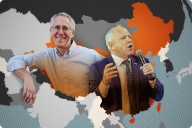You have /5 articles left.
Sign up for a free account or log in.
Talented Indian scientists and academics in the making have flown West again and again, seeking out academic and research opportunities in Britain and the United States.
But in recent years, as the country’s economic fortunes have changed, some have ventured back, testing the waters to see how the climate might have changed for those who want to teach and research in the country they left behind.
Somak Raychaudhury, who until recently taught astrophysics at the University of Birmingham in Britain, is one such scientist. In 1984, he left India for a second undergraduate degree at Trinity College at the University of Oxford. He then earned his doctoral degree from Churchill College at the University of Cambridge. He was also a visiting fellow with the Harvard-Smithsonian Center for Astrophysics, before teaching at Birmingham.
Last month, Raychaudhury, who is 50, moved back with his wife and son to Kolkata, his hometown in eastern India, to assume the reins as the head of the physics department at Presidency University, his alma mater, where he earned a bachelor’s degree in physics in 1984.
Raychaudhury’s move is part of a bold new effort at Presidency to reset and revamp a nearly 200-year-old public institution long recognized for its pedigree, including producing some of the country's best-known intellectuals, such as the filmmaker Satyajit Ray, and Amartya Sen, a Harvard economics professor who received a Nobel Prize. The university, formerly known as Presidency College, suffered years of neglect and arbitrary policies under a Communist-run state government. But the Communists lost the elections in 2011, ushering in a new government that set in process the changes underway at the university.
Presidency plans to hire about 180 new faculty members, many of them from abroad, to boost the quality of its teachers. Raychaudhury is among the first group of faculty members to be hired. (Existing faculty members have the option of applying for the openings or seeking a transfer to other state-run universities.)
Raychaudhury’s brief is to modernize the physics curriculum and introduce new branches of physics to students. "Presidency needs to ensure that students are taught by those who are at the cutting edge of research, and that students are involved in and inspired to do research,” he said in an e-mail. “The teaching material has to be constantly updated. Teaching has to be hands-on.”
Raychaudhury is familiar with the obstacles at hand – especially an all-pervading bureaucracy that can stifle innovation and effort. And there certainly are some Indians who lived in the Western world and then tried to move back to India with unhappy results.
“When returning, it is important to ask oneself what an individual is returning for, and whether they have a realistic view of what to expect from the system in India,” he said. For a university academic, especially in physics, the facilities becoming available in India for astrophysics are world-class, he said. Raychaudhury mentioned a Giant Metrewave Radio Telescope, the largest of its kind in the world, that is being operated in Pune. There is also the South African Large Telescope, where India has 15 percent of the observing time.
Seventeen years ago, Raychaudhury tried a stint in India, working as a faculty member at the Inter-University Centre for Astronomy and Astrophysics in Pune, a city in western India, where he worked with universities around the country to modernize their physics courses. He left after five years, in part because he was frustrated being at the “bottom of the ladder.”
This time around, things may well be a little different.
As department head, he is at the top of the ladder, and has more control over the kind of research he chooses to do. And he certainly feels more at home at Presidency and Kolkata than in Pune, Raychaudhury said.
The university is affiliated with the state of West Bengal, and salaries at state institutions lag behind other Indian universities under the control of the national government.I don't quite understand the distinction being made here and what exactly it means. SG But new faculty members are being given additional professional development and research funds.
Raychaudhury’s salary at Presidency will be a fifth of what he used to make in Britain. The university’s salaries are about 15 percent lower than those affiliated with the national government, such as the Indian Institute of Technology campuses. He said that the salary range for professors at the university ranges from 75,000 to 140,000 ($1450 to $2705 at current exchange rates) in Indian rupees. Of course, the cost of living in India is much lower.
.and what is the salary range? can we say in dollars? -- would also be fine to note differences in cost of living, but need to be explicit about this -sj
“If I had an equivalent job in the United States, I would have earned a factor of 8-10 more,” Raychaudhury said. He acknowledged that the issue would make it hard to recruit some faculty members.could possibly lead to some difficulties" seems way understated -- how about: "He acknowledged this issue could make it hard to recruit some faculty members." -sj) "If I wanted a high salary, I would have been a banker. I don't know of many academics (at least in the sciences) who chose their profession attracted by high salaries," he said.
Subir Sarkar, a physics professor and head of the particle theory group at the University of Oxford, who knows Raychaudhury well, said that there was a certain degree of idealism in his decision. “We had a long chat as a month or so ago after he returned from a trip to Kolkata and it was clear that he had a good understanding of the ground realities,” Sarkar wrote in an e-mail. “Fortunately this initiative does have renowned intellectuals behind it and the VC [vice chancellor] of Presidency (Malavika Sarkar) seems to be [doing] all she can to support people like Somak.”
Sarkar feels that the research climate in India has changed in the last 10 years, especially in areas such as theoretical physics.
Still, Raychaudhury is only on “long leave” from the University of Birmingham, continues to be in charge of several doctoral students there, and will be back at the university in November to teach. “I’m thinking in small chunks. We will rent a house and slowly see how it goes,” he said.
Sugata Bose, a Harvard history professor who chairs the Presidency Mentor Group, a collection of well-known academics, many of them alumni, said his group has been tasked with making Presidency a “world-class university.” Bose said he was delighted that scientists like Raychaudhury are making the move. “There are others waiting in the wings. We needed a few scholars to accept in the early stages,” he said.
The group was aiming to find the right balance between hiring well-known scientists and the next generation of scholars, Bose said. “I think the next challenge will be retention,” he said. Other tasks include improving research facilities, offering doctoral degrees and new majors, and encouraging interdisciplinary scholarship. “Once we have a critical mass of faculty, we will ask them to take the initiative,” Bose said.
But challenges lurk everywhere.
Last month, Sukanta Chaudhuri, a member of the mentor group, resigned because he disagreed with the way Presidency was being singled out for special treatment. “The widening gap between what is proposed for Presidency University and what other state universities, including centers of excellence, are getting has led me to resign,” Chaudhuri said in his resignation letter, according to The Indian Express newspaper.
Philip G. Altbach, a professor of higher education at Boston College and an expert on the Indian academic scene, said Presidency’s goals to become a world-class university are admirable, but questioned what would happen if a different political party were to come to power in the state of West Bengal.
Referring to Mamata Banerjee, the chief minister of the state, he said: “If she can upgrade, they can downgrade.”
“It takes a long time to do something ambitious, and to keep it sustainable,” said Altbach, who is an Inside Higher Ed blogger.
He wondered whether plans to recruit a world-class faculty would really succeed given that such faculty tend to be well-entrenched and well-paid where they are. And Indian universities certainly cannot match salaries paid in dollars, Altbach said.
The country’s infamous red tape can also come in the way. Foreign nationalsdoes this include expats who have given up citizenship? no they usually have a special status called overseas citizen of india, or person of indian origin -- Kaustuv -- can you add that to text of story? -sj who want to teach at Presidency (or another Indian university) cannot be appointed full-time because of visa regulations, Altbach pointed out. (Many Indian-born academics who live abroad and have acquired foreign citizenship do not need visas to work in India because they have a special status such as Overseas Citizenship of India or Person of Indian Origin.)
“Don’t forget the dead hand of the bureaucracy,” Altbach warned.








